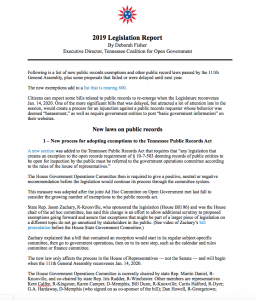2019 Legislative Report: New exemptions to Public Records Act, and bills that failed or were delayed
Following is a list of new public records exemptions and other public record laws passed by the 111th General Assembly, plus some proposals that failed or were delayed until next year.
(If you would like to print this, here is the legislative report in PDF format without photos.)
The new exemptions add to a list that is nearing 600.
Citizens can expect some bills related to public records to re-emerge when the Legislature reconvenes Jan. 14, 2020. One of the more significant bills that was delayed, but attracted a lot of attention late in the session, would create a process for an injunction against a public records requester whose behavior was deemed “harassment,” as well as require government entities to post “basic government information” on their websites.
New laws on public records
1 – New process for adopting exemptions to the Tennessee Public Records Act
A new section was added to the Tennessee Public Records Act that requires that “any legislation that creates an exception to the open records requirement of § 10-7-503 deeming records of public entities to be open for inspection by the public must be referred to the government operations committee according to the rules of the house of representatives.”
The House government operations committee then is required to give a positive, neutral or negative recommendation before the legislation would continue its process through the committee system.
This measure was adopted after the joint Ad Hoc Committee on Open Government met last fall to consider the growing number of exemptions to the public records act.
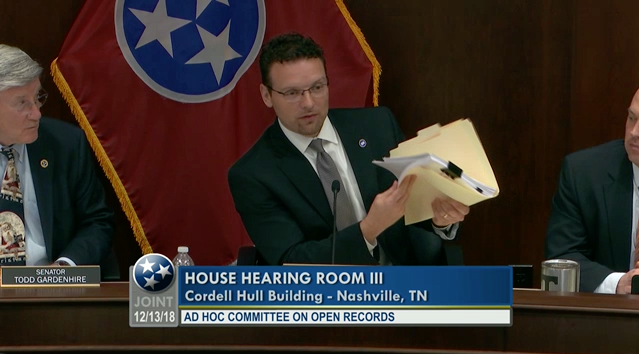
State Rep. Jason Zachary, R-Knoxville, who sponsored the legislation (House Bill 86) and was the House chair of the ad hoc committee, has said this change is an effort to allow additional scrutiny to proposed exemptions going forward and assure that exceptions that might be part of a larger piece of legislation on a different topic do not go unnoticed by stakeholders in the public. (See video of Zachary’s bill presentation before the House State Government Committee.)
Zachary explained that a bill that contained an exception would start in its regular subject-specific committee, then go to government operations, then on to its next step, such as the calendar and rules committee or finance committee.
The new law only affects the process in the House of Representatives — not the Senate process — and will begin when the 111th General Assembly reconvenes Jan. 14, 2020.
The House Government Operations Committee is currently chaired by state Rep. Martin Daniel, R-Knoxville, and co-chaired by state Rep. Iris Rudder, R-Winchester. Other members on the 15-member committee are representatives Kent Calfee, R-Kingston; Karen Camper, D-Memphis; Bill Dunn, R-Knoxville; Curtis Halford, R-Dyer; G.A. Hardaway, D-Memphis (who signed on as co-sponsor of the bill); Dan Howell, R-Georgetown; Justin Lafferty, R-Knoxville; William Lamberth, R-Portland; John Ragan, R-Oak Ridge; Jay Reedy, R-Erin; Cameron Sexton, R-Crossville; Mike Stewart, D-Nashville; and Ryan Williams, R-Cookeville.
In presenting the bill to the subcommittee, Zachary said that this only addresses exemptions going forward. “We’re still in conversation about how to deal with the existing (nearly 600) exemptions and there will probably be an additional ad hoc committee on that this summer.”
2 – Street addresses and telephone numbers in accident reports
A new exemption makes confidential a person’s home street address, zip code, telephone number, driver’s license number and insurance information that is contained in “any motor vehicle accident report” confidential.
The law designates this information as “personally identifying information” for purposes of accident reports, and allows only those involved in the accident, or their agent or legal representative, to access these confidential pieces of information.
Other information in the accident reports remain open to the public, including the names of the individuals involved in the accident, the cities or counties of their residence, their dates of birth and information about the accident itself.
The new exemption has a repeal date of June 30, 2026, meaning that to remain in effect, the law would require action by the Legislature to renew or amend it.

State Rep. Jason Powell, D-Nashville, and state Sen. Becky Massey, R-Knoxville, said they sponsored the legislation in response to numerous complaints from residents about phone solicitations for health care services after they were involved in traffic accidents.
The previous law made it a misdemeanor for a person to use accident reports for solicitation that “is prohibited by a standard of conduct or practice of any profession licensed by the state” and subjected a person who holds a license to be punished by a fine.
The new provisions continue to make this a crime, and adds as a crime any person who misrepresents their identity or makes a false statement to access the “personally identifying information.” Both are now Class B misdemeanors, punishable by a fine of up to $2,500 per occurrence.
In addition, the new provisions allow a person whose “personally identifying information” is obtained in violation of the law to sue the person in court, with civil penalties of up to $2,500 per occurrence, with a possible award of attorneys’ fees and costs.
The bill as initially filed would have made the names of people involved in accidents confidential, along with their addresses and dates of birth. But the sponsors amended the bill at the request of those who access traffic accident reports. The Tennessee Press Association and Tennessee Coalition for Open Government, for example, pointed out that major traffic accidents are often reported upon by local news media who have traditionally included the name and age of those involved in the accident, as well as where they are from, because of public interest.
The law goes into effect on July 1, 2019.
3 – College sport competitive information
Because of increased betting on college sports and potential pressure to gain insider information, the University of Tennessee sought an exemption that would protect records of coaches and sports teams that are traditionally not disclosed to the public.
The new exemption makes confidential “records maintained by an intercollegiate athletics program of a public institution of higher education…if the records contain information relating to game or player integrity and that is traditionally not revealed publicly due to the public institution of higher education’s need to maintain competitiveness in the sport to which the records relate.”
The list of information that could be withheld includes:
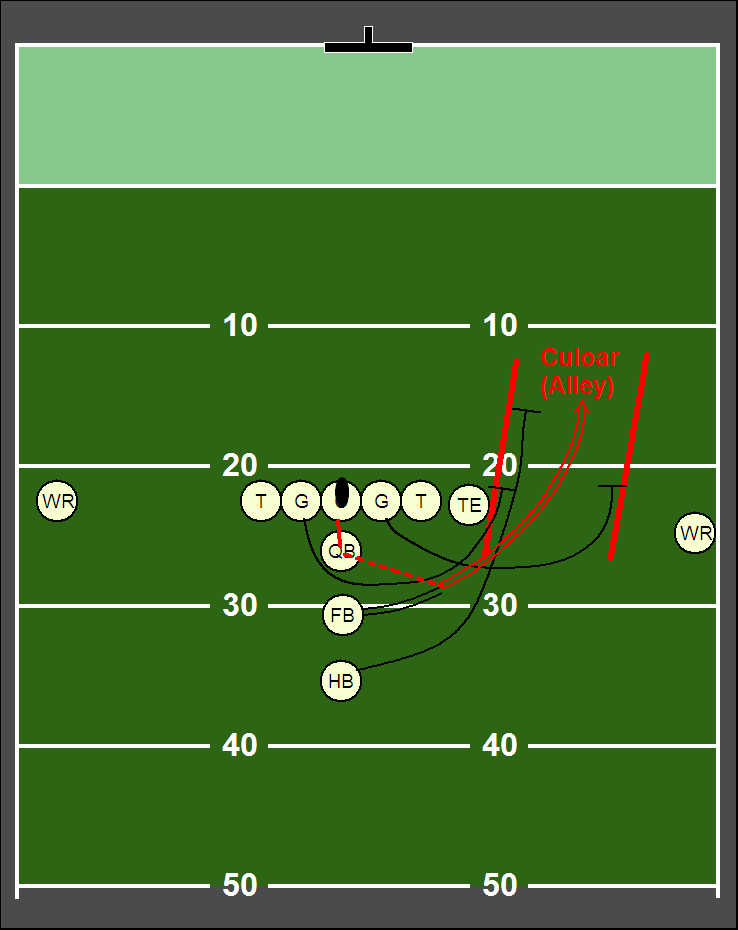
- plays or playbooks;
- signals, plans, techniques, philosophies, strategies, systems, drills, or schemes for practices, games, or other team activities;
- recordings of practices, games, or other team activities;
- assessments of a participant including a player, recruit, game official, or opposing coach; and
- information related to nutrition, medical care, physical therapy, recovery, strength-training, and conditioning, or a player’s likelihood of participating in a sport or athletic competition.
The new exemption states that records will remain open “that relate to a notice of an allegation by, or a determination of, the National Collegiate Athletic Association (NCAA) that an individual or institution violated a NCAA rule, including but not limited to, a warning, reprimand, fine, suspension, termination, or other similar action, imposed by a public institution of higher education or the NCAA.”
The exemption also does not cover records “that relate to a court’s or governmental agency’s determination that an individual or a public institution of higher education violated a law.”
The new section says that it “does not prohibit a coach or other employee of a public institution of higher education from releasing information related to a player’s injury, a player’s or team’s readiness to participate in a competition, or any other observation or strategy if the release of information is part of the traditional and regular communication that a coach or other employee of a public institution of higher education voluntarily releases to inform the public.”
Finally, the section requires that records or parts of records made confidential by the new exemption must be released to the public upon a public records request “when the public’s interest in the content of the records outweighs the interest of game or player integrity or the need to maintain competitiveness…or when the game or player integrity or the need to maintain competitiveness in a sport are no longer relevant due to the passage of time.”
It defines “public interest” as including, but not limited to, “accountability of the public institution of higher education, public officials, or employees of the public institution of higher education.” The exemption has a repeal date of July 1, 2026.
4 – Destruction of juvenile court records
A new law allows clerks of juvenile courts under direction of their judges to dispose of records in “delinquent and unruly juvenile court cases” 10 years after the juvenile has reached 18 years old.
The law allows the district attorney to file a notice of opposition to the proposed order to destroy any such records.
The new provision is part of current law governing disposal of court records, which allows some records to be disposed under the direction of the judges, but requires retention of pleadings, original process and original opinion, and appearance and execution dockets.
This would allow for all records in juvenile cases to be disposed: “original pleadings, process, opinions, records, dockets, books, ledgers, and all other documents….”
5 – Juvenile court records, aggravated sexual battery
Lawmakers expanded what petitions and court orders in juvenile delinquency proceedings must remain open to the public by adding aggravated sexual battery to a category of crimes in which records are deemed open.
The existing exemption allows files and record of juvenile courts to be closed to the public except for petitions and orders in cases involving a juvenile who is 14 or older and whose conduct would constitute one of the following violent crimes: first degree murder, second degree murder, rape, aggravated rape, rape of a child, aggravated rape of a child, aggravated robbery, especially aggravated robbery, kidnapping, aggravated kidnapping and especially aggravated kidnapping.
The new provision adds aggravated sexual battery.
Aggravated sexual battery is defined in statute as “unlawful sexual contact with a victim by the defendant or the defendant by a victim accompanied by any of the following circumstances:
(1) Force or coercion is used to accomplish the act and the defendant is armed with a weapon or any article used or fashioned in a manner to lead the victim reasonably to believe it to be a weapon;
(2) The defendant causes bodily injury to the victim;
(3) The defendant is aided or abetted by one (1) or more other persons; and
(A) Force or coercion is used to accomplish the act; or
(B) The defendant knows or has reason to know that the victim is mentally defective, mentally incapacitated or physically helpless; or
(4) The victim is less than thirteen (13) years of age.”
State Rep. Bud Husley, R-Kingsport, explained to the House Criminal Justice Subcommittee that another state law required parents or guardians of a juvenile to report to a principal of a school if their child is adjudicated for aggravated sexual battery. The change assures that this information is public from the court and can be released, he said.
6 – Government settlement agreements related to sexual harassment and other claims
A new provision will be added to the law on settlement agreements that allows settlement agreements “entered into by a governmental entity” to keep confidential the identity of a person who is the victim of sexual harassment; domestic assault; unlawful photography in violation of privacy; incest; child abuse, neglect or endangerment; and aggravated child abuse, neglect or endangerment.
The new law says that government settlement agreements that prohibit the disclosure of any person except the victim of the above-named crimes “is void and unenforceable as contrary to the policy of this state.”

State Rep. Bill Beck, D-Nashville, said he brought the bill to make sure that the identities of the name of the harasser or offender cannot be put under seal in a settlement agreement entered into by a government entity, but to allow for the name of the victim to be confidential.
Settlement agreements between a private party and a governmental entity are generally considered to be open under the public records law because the agreements are entered into as part of a transaction of official government business, according to the Office of Open Records Counsel. In a recent letter, the Open Records Counsel stated: “Courts in Tennessee and the Tennessee Attorney General have determined that confidentiality provisions in a settlement agreement that restrict access to otherwise open public records are unenforceable and violate public policy because only the legislature has authority to make public records confidential.”
7 – School bus video
A new law regarding footage from school bus video requires local school boards who use cameras on school buses to adopt a policy to allow a student’s parent to view the footage, or photographs, from the cameras. The new law says the policy must require that the footage be viewed under the supervision of the director of schools or a school official designated by the director.
The law requires that the policy comply with the Tennessee Public Records Act and the Family Educational Rights and Privacy Act and other relevant state or federal privacy laws.
The law also requires the school board to “establish the duration for which an LEA (local education agency) must maintain photographs or video footage collected from a camera or video camera installed inside a school bus.”

The bill arose after a Lewisburg mother, Brooke Wilkerson, faced roadblocks in trying to find out what happened to her kindergartener on a school bus.
The district initially would not let her view video from the bus, where her daughter indicated she had been kissed and was involved in a “secret tickling game.”
When finally allowed to see the video, only 4 weeks were available and it was saved in 5-minute segments resulting in about 2,000 clips to view, with no way to organize them, Wilkerson said.
Her state senator, Sen. Shane Reeves, R-Murfreesboro, agreed to carry the bill, and Wilkerson testified before the State Education Committee about her experience.
Tennessee school officials have sometimes denied news reporters access to bus and other school video, and other times have released video with children’s faces blurred. Often cited in denials is FERPA, which protects access to student records, and a similar state public records exemption that protects “records of students.” Under FERPA, a parent has a right to inspect their own student’s records, but school bus video may not be considered a “FERPA” record as it is not usually maintained as a student record. Parents also already have a right under state law to inspect their child’s education records.
8 – Tennessee Public Participation Act
After a similar proposal failed to get out of a committee last year, an anti-SLAPP measure passed the General Assembly with overwhelming support this session. This is not directly related to public records, but it relates to protecting participation in the democratic process, which is the principle underlying citizen access to public records.
SLAPP (Strategic Lawsuits Against Public Participation”, recognizes a type of lawsuit that is used to silence or harass critics by forcing them to spend money to defend baseless suits.
Recognizing how such lawsuits create a chilling effect on constitutional rights such as freedom of speech and the right to association, several states have passed statutes to allow methods in court to dismiss such actions earlier in the process than is usual with other litigation.

The Tennessee Public Participation Act “is to encourage and safeguard the constitutional rights of persons to petition, to speak freely, to associate freely, and to participate in government to the fullest extent permitted by law and, at the same time, protect the rights of persons to file meritorious lawsuits for demonstrable injury,” the new law states.
It provides that “(i)f a a legal action is filed in response to a party’s exercise of the right of free speech, right to petition, or right of association, that party may petition the court to dismiss the legal action,” and discovery is stayed until a judge enters an order.
The new law outlines what the parties to the lawsuit have to prove for dismissal or to allow the suit to continue. It also allows an immediate appeal of the court’s order and says that if a court dismisses the action, the petitioning party shall be awarded court costs, reasonable attorney’s fees and any other relief that the court “determines necessary to deter repetition of the conduct by the party who brought the legal action…”
State Sen. Steve Dickerson, R-Nashville, and state Rep. Bob Ramsey, R-Maryville, carried the legislation.
9 – Donors to the Tennessee State Museum
Under a new exemption to the Tennessee Public Records Act, donors to the Tennessee State Museum may request some of their personal information be withheld from the public.

The information that can be confidential includes a donor’s:
- Residential information, including the street address, city, state, and zip code;
- Home telephone and personal cell phone numbers;
- Social security number;
- Electronic mail address; and
- Taxpayer identification number.
The name of the donor and the amount donated are not confidential and would remain open under the Tennessee Public Records Act.
The bill’s sponsor, state Sen. Bo Watson, R-Hixson, said this would protect the privacy of donors who don’t want to be solicited by others who could have obtained their contact information in a public records request.
The new exemption would be repealed on July 1, 2026.
Public records proposals that were delayed or didn’t pass
1 – Tax credits for economic development
While portions of a proposed bill called the FACTS Act (Fair Accountability and Clarity in Tax Subsidies) eventually became law (Public Chapter 451), the portions related to transparency in economic development did not make the final cut.
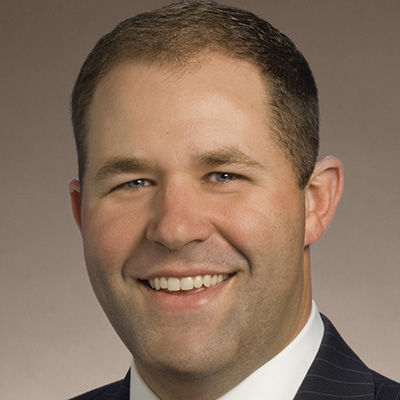
Part of the bill had proposed to roll back a public records exemption that makes confidential the award of tax credits to companies who create new jobs or make capital investments in Tennessee.
Currently, the state releases the aggregate value of tax credits claimed each year. In December, it updated its fiscal year 2017 report to show that $218.5 million had been claimed in such credits in that period and $1.3 billion was being carried forward by businesses in credits awarded but not yet claimed.
The state does not release which companies are awarded the credits under an exemption that makes all tax information confidential.

This is unlike most other states where recipients of such tax credits and their value is public information. Tennessee officials resisted opening up the information and said the few remaining states that still keep such information confidential are states with which Tennessee directly competes for business, including Alabama, Georgia and South Carolina.
The bill also would have eliminated all statutory language that allow the commissioners of the Department of Economic and Community Development and Revenue Department to bend the rules and give tax credits even when companies do not meet the statutory requirements to receive them.
The law says the commissioners can ease the requirements when it is in the “best interest” of the state. According to ECD, about 15 such “best interest” determinations have been made since 2013. Who got the awards and the value of the awards is confidential, ECD said.
The portion of the FACTS Act approved by the General Assembly retained most language in the law allowing the discretionary tax credits to continue, although it did eliminate four tax credit circumstances in which the commissioners could no longer grant waivers of statutory requirements. These were:
- tax credits related to jobs for a new headquarters;
- an additional tax credit for jobs in an “enhancement” county;
- additional annual tax credits for higher levels of investment and job creation; and
- job tax credits related to the relocation of a scrap metal facility from a central business district that is next to a waterway.
None of the now-eliminated circumstances appear to have been used by ECD or the Revenue Department since 2013.
In its October 2018 letter outlining when discretionary credits were given since 2013, ECD said 10 were given by extending the investment period that had been statutorily required to get a credit, and five by waiving the 90-day requirement in the law that a position had to be open before considering it a newly created position for purposes of a tax credit. Those waivers will still be allowed.
Perhaps the most significant part of the FACTS Act that did pass the Legislature is a new requirement that the state must include clawback provisions in its economic development agreements that give the state “the right” to recover funds “in whole or in part, if the person or entity benefitting from the grants, funds, or other incentives fails to fulfill the commitments made by the person or entity to the department of economic and community development.”
This codifies a practice begun under previous Gov. Bill Haslam.
The bill had aimed for beefier requirements on reports that companies must submit detailing how many jobs were actually created. But that provision, too, did not make the final bill.
State Sen. Kerry Roberts, R-Springfield, and state Rep. Andy Holt, R-Dresden, carried the bills.
2 – Harassing requesters and required disclosure of basic government information
Proposed legislation that would allow a government entity in Tennessee to get an injunction to stop public records requesters whose requests constituted “harassment” has been delayed until next year.
The bills, Senate Bill 590 and House Bill 626, sought to allow government entities to stop a public records requester from making further requests if a judge found the requests to be made “in a manner that would cause a reasonable person, including a records custodian or any staff of the public entity in control of the public records, to be seriously abused, intimidated, threatened, or harassed.”
The bills’ sponsors, Rep. William Lamberth, R-Portland, and Sen. Ferrell Haile, R-Gallatin, offered different amendments to their bills before asking to defer committee action until the first calendars of 2020. Both said they filed the bills at the request of the city of Gallatin, which had been overwhelmed by requests to inspect records from one particular public records requester.
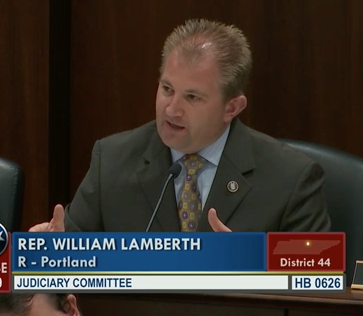
Rep. Lamberth’s amendment altered language so that an injunction could only be issued to public records requesters who were using the “free inspection” option. Under the amendment, the requester’s whose behavior was “harassment” could lose the “free inspection” option and be required to pay all costs associated with requests, including labor, going forward.
Also, Lamberth’s amendment gave a pass to journalists and others by stating that a public records request to gather government information for the purpose of broadcasting, publishing or distributing information to others could not constitute harassment. For tracking purposes, the amendment also required reports to the Office of Open Records Counsel when a government entity sought an injunction against a requester.
But perhaps the most significant change to Lamberth’s bill were requirements that government entities make public records more easily accessible to the public.
Lamberth said he heard from hundreds of people across Tennessee including those frustrated with getting public records from governments. He added a requirement to his bill that government entities post “basic information” on their website.
Basic information as defined in his bill would include:
- Agendas for upcoming public meetings;
- Minutes from public meetings;
- Other meeting documents for upcoming meetings that were provided to board members in a board packet;
- The annual comprehensive financial report of the government entity;
- Policies, rules, ordinances, or resolutions governing the public meetings, public hearings, and public records of each governing body; and
- A list of members of county commissions, city councils, boards of aldermen and other governing bodies.
Interest and opposition on some parts of the bill prompted the lawmakers to delay the bills to the “first calendars” of 2020.
3 – 911 calls
Legislation to make 911 calls and transmissions confidential was delayed after the House sponsor said he wanted to work more on the bill over the summer.
The bill, HB 335, would have created an exemption to the Tennessee Public Records Act for all 911 calls, making them only available for use by law enforcement, the courts and other governmental agencies.

State Rep. Rick Tillis, R-Lewisburg said he was concerned about calls with sensitive information being played on television stations and causing distress to callers.
The Tennessee Press Association and Tennessee Association of Broadcasters lobbied against the bill, pointing out that access to 911 calls have led to numerous news stories uncovering problems within the 911 system, even government corruption.
The calls have also been used to document natural disasters, such as when the Knoxville News Sentinel used 911 calls to shed light on what happened during the devastating Gatlinburg wildfires a few years ago.
Tillis said he wanted to work more on the bill over the summer and planned to bring it back in 2020. The Senate sponsor is Shane Reeves, R-Murfreesboro.
4 – Trade secret exemptions involving government payments
House Bill 370, sponsored by State Rep. Martin Daniel, R-Knoxville, would have limited the ability of businesses to claim a government payment to them as confidential under the trade secret law. It failed to make it out of subcommittee.
Tennessee Coalition for Open Government provided testimony on the merits of the bill.
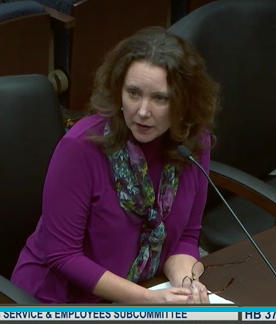
The bill would have changed the interplay between the Tennessee Public Records Act and the law governing trade secrets, and limited a private company’s ability to veto release of government records that show the amount of a government payment or monetary value of government property conveyed to them.
Members on the House Public Services and Employees Subcommittee, many of whom had been contacted by their worried local chambers of commerce, said they were concerned that limiting a company’s ability to keep confidential such payments or financial benefits could put Tennessee on an unequal playing field when recruiting businesses to the state.
Daniel made a strong case for the law: “It is we, the Legislature, representatives of the people, who should declare what is a trade secret and what is confidential (about government transactions). Not these private entities who are receiving government benefits.”
5 – Jail booking mugs
A caption bill (HB1054 / SB745) that would make jail booking mug shots confidential was deferred by its House sponsor Rep. Mark Hall, R-Cleveland. Hall said he had been asked to carry the legislation on behalf of a constituent, but wanted additional time to study the issue.
6 – Photography of public records
A caption bill carried by state Sen. Mike Bell, R-Riceville, and state Rep. Jeremy Faison, R-Cosby, sought to add language to the public records act limiting when a government entity could prevent a person from taking a photo of a public record. However, after a bill review in which representatives from government entities pushed back mightily against a change, and lawmakers appeared unready to make a favorable vote, Faison took the bill off notice in the House, and Bell had his assigned to general subcommittee for the summer in the Senate.
The bill numbers were HB223 and SB434, and it’s possible the lawmakers will revive the effort next year.
TCOG worked with the lawmakers on the bill.
7 – Confidentiality agreements with regard to public records
An amended bill that would have prohibited a government entity from entering “into a confidentiality agreement with a third party in regards to records that are otherwise considered open to the public and are not otherwise confidential or protected under state or federal law” passed the Senate unanimously.
But it was taken off notice in the House State Committee after being passed out of subcommittee.
State Sen. Todd Gardenhire, R-Chattanooga, was the Senate sponsor, and state Rep. Jeremy Faison, R-Cosby, was the House sponsor.

